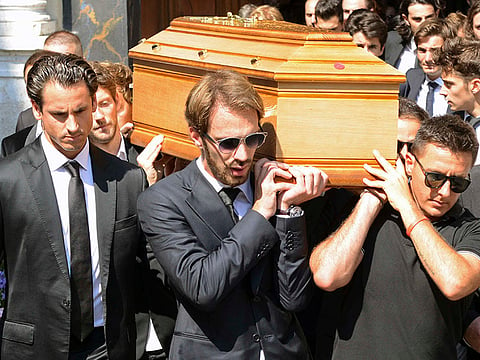F1: Jules Bianchi was a world champion-in-waiting
Tragic young French driver was being lined up by Ferrari to replace Raikkonen

The tragic death of gifted young French driver Jules Bianchi after nine months in a coma following his fateful 100-plus mph crash into a rescue tractor at the Japanese Grand Prix has stunned the close-knit Formula One brotherhood.
He would have been 26 next month, August 3, and heading for a crucial and exciting turning point in his career as a replacement for ex-champion Kimi Raikkonen at Ferrari, his dream appointment.
Fate, however, played its cruel hand and he became the first driver to die as a result of frenetic grand prix action since legend Ayrton Senna perished at Imola, Italy, at the San Marino grand prix in 1994.
My information is that the utterly charming, likeable and full of promise Bianchi was being secretly nurtured towards a Ferrari take-up, valued as a complete contrast to the gloomy Finlander Raikkonen, a struggler this year and, almost certainly, heading for the exit door at the team’s Maranello headquarters.
No less an authority than Luca di Montezemolo, the esteemed former overlord at Ferrari, but now sidelined, backs up my feedback and confirms: “He was one of us. Just our type. And we had picked him for the future once our collaboration with Raikkonen was over.
“He was a first rate guy — private, polite, promising, fast ... very fast ... and very attracted to Ferrari.”
It was Ferrari who helped quietly spoken newcomer Bianchi secure a drive with Marussia, the Anglo-Russian minnow grand prix team, based in the UK, and retained him as a member of the Ferrari Driving Academy.
His antecedents blessed him with an impeccable pedigree as a racer of immense potential and a world champion-in-waiting.
His grandfather, Mauro Bianchi, was three times champion in the GT title chase in sports car racing. His great uncle, Lucien, contested 17 GPs during the 1960s and won the Le Mans 24 Hours in 1968 before being killed in a crash a year later aged 34.
As a relative unknown, he impressed F1 insiders by clinching ninth place for his — and Marussia’s — first ever championship points, around the treacherously testing barrier-lined Monaco Grand Prix street circuit.
In the fiercely contested Formula Three European Championship, he finished third in 2008 and a year later won the title with eight victories and a race to spare.
Noted talent-spotters Ferrari were attracted to him and, at the end of 2009, he represented the famous name at a young drivers’ test in Jerez, Spain, and graduated from the Italian giants’ academy.
His career, despite an injury sustained in a GP2 accident in 2010, progressed rapidly from there.
There was, it seemed certain, no limit to his chances of hitting the hierarchical levels of Formula One, until that fateful smash at Suzuka.
It could be argued he had taken a risk too many, was going too fast and had either ignored or missed seeing warnings to slow down on what had deteriorated disastrously into a skidpan of a track.
Whatever, he was a born racer whose budding brilliance and flair was so tragically cut short and has left the sport of chance in mourning.
His saddened fellow racers will pay their respects with a minute’s silence on Sunday ahead of the Hungarian Grand Prix.
— The writer is a freelance journalist and motorsport expert
Sign up for the Daily Briefing
Get the latest news and updates straight to your inbox



